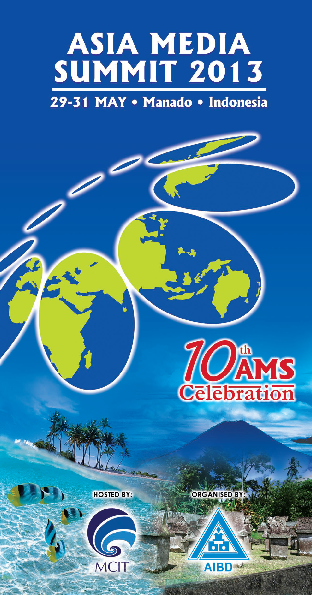Delegates from ten Asia-Pacific and African broadcasters are participating in the 3D Master Class, one of five pre-summit sessions preparatory to the Asia Media Summit 2013 in Manado, Indonesia. Ms. Sarah Rotter, a stereographer of Stereotec in Germany and the workshop trainer, said using 3D technology would reap benefits for broadcasters as well as consumers.
Delegates from ten Asia-Pacific and African broadcasters are participating in the 3D Master Class, one of five pre-summit sessions preparatory to the Asia Media Summit 2013 in Manado, Indonesia. Ms. Sarah Rotter, a stereographer of Stereotec in Germany and the workshop trainer, said using 3D technology would reap benefits for broadcasters as well as consumers.
She said 3D technology gives viewers more information and engages them more into the story; it also activates many parts of the brain, creating a deeper connection with the images on the screen.
In her lecture, she emphasized that directors, cinematographers and broadcast production specialists should educate themselves and know critical quality elements of 3D.
“This is important because if the market views one 3D program that is badly produced and causes physical discomfort because of misalignment, it will blame the 3D technology and they will refrain from watching them. So quality is critical,” she stressed.
She also said that in producing a 3D program, this should be done right by tapping experts, getting the right equipment and pursuing continuous learning.
Does the future belong to 3D technology? Ms. Rotter said she is not suggesting everything should be in 3D, but it will be here to stay as the advent of digital technology has offered broadcasters opportunities to produce high quality program.
3D Technology Benefits
Delegates from ten Asia-Pacific and African broadcasters are participating in the 3D Master Class, one of five pre-summit sessions preparatory to the Asia Media Summit 2013 in Manado, Indonesia. Ms. Sarah Rotter, a stereographer of Stereotec in Germany and the workshop trainer, said using 3D technology would reap benefits for broadcasters as well as consumers.
Transmedia Programming
Understanding the behaviors and trends of audience media consumption and expanding core story over timelines, territories and platforms are two important components of a successful transmedia programming that can attract and excite audiences.
Workshop on Election Coverage
The AIBD/TVRI In-country Workshop on Election Coverage is held in Manado, Indonesia from 25 - 27 May 2013, prior to the Asia Media Summit. The workshop focuses on how to have smart election programming based on media's role in democracy with high quality coverage – reflecting accuracy, fairness and balance.
Welcome to Manado for the 10th AMS Celebration
The Asia Media Summit (AMS) 2013, organised by the Asia-Pacific Institute for Broadcasting Development (AIBD) and hosted by Ministry of Communication and Information Technology (MCIT) together with Provincial and Local Governments will be held in Manado, Indonesia from 29 to 31 May 2013. Several pre-summit events will also be held from 26 - 28 May 2013.
AMS Information
It is our great pleasure to welcome you to the beautiful city of Manado for the occasion of the 10th Asia Media Summit. We hope that your travels to this special venue will be smooth, and we look forward to your involvement in the coming exciting days.
AMS 2013 – Session 2
Day 1 - Wednesday, 29th May, 1600 - 1730
Session 2: Dealing with Ethics: Are Existing Models Effective?
As audiences become more demanding and discriminating, broadcast organizations will need to pursue a healthier mechanism to deal with ethical complaints and violations. Existing models include state regulation, self-regulation and co-regulation. Are they still valid and effective? Are codes of ethics making sense to promote professionalism? Do we need a more robust organization to enforce media ethics? Is there a role for the state in a self-regulatory system? What is a better alternative?
AMS 2013 – Parallel Session 2
Day 1 - Wednesday, 29th May, 1400 - 1530
Parallel Session 2: Media Literacy: Fulfilling Its Mandate
Initiatives on media literacy programs in order to gain critical autonomy relationship with all media in Asia-Pacific have been wanting. In some countries, media literacy in schools is subsumed in other subjects. Others emphasize acquiring production skills to help people understand, produce and negotiate meanings in a culture made up of powerful images, words and sounds. How can we promote and expand media literacy? Can we extend emphasis to other areas such as building an informed citizenship, aesthetic appreciation and expression, social advocacy, self-esteem, and consumer competence? What are some best media literacy practices?
AMS 2013 – Parallel Session 1
Day 1 - Wednesday, 29th May, 1400 - 1530
Parallel Session 1: Taking More Action for Sustainable Development: Can Media Help?
The recent United Nations Conference on Sustainable Development, more known as Rio+20 Earth Summit in 2012 has raised more concerns and expectations in dealing with an accelerating ecosystem degradation and increasing number of climate-induced extreme weather events. Compounding these problems are the global financial crisis, food and water scarcity, and volatile oil prices. As these multiple crises continue to become the dominant stories, can old and new media help build the capacity of a growing human population to live peacefully and sustainably on this planet?
Noted speakers make AMS 2013 a special gathering
AMS 2013 Day Two (30 May) continues with the fascinating




